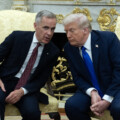Welcome to Need to Know, The Hub’s roundup of experts and insiders providing insights into the developments Canadians need to be keeping an eye on.
Today’s weekend edition dives into thought-provoking research from think tanks, academics, and leading policy thinkers in Canada and around the world. Here’s what’s got us thinking this week.
Another week, another round of destabilizing actions from the Trump administration. In the last few days, the president has called Ukrainian President Zelensky a “dictator.” This was shortly after his secretary of state sat down with real dictators in Riyadh ostensibly to negotiate an end to the Russo-Ukrainian War. Apparently, however, without the need for Ukraine to be at the table.
While Trump’s criticisms of Zelensky and Ukraine drew applause from Putin’s acolytes, the episode appears to be another in a growing list that signals America’s retreat from the prevailing international order and, ultimately, its decline as the world’s dominant power.
This trend is something we’ve begun to unpack recently, so let’s dive a bit deeper into some themes.
Yes, the United States is in (relative) international decline
Last weekend, The Hub released an essay on the sharp turn in American conservative policy thinking that has occurred from Reagan to Trump. If the thinking behind the Reaganite foreign policy vision was American primacy, then what Trump is choosing for America can be best described as embracing decline.
The most common criticism we received about the piece was that our use of the word “decline” to describe the intellectual and policy views of Trumpian Republicans was unfair, reflecting a normative view.
Co-author Sean Speer responded that “A conscious effort to reset the post-Cold War world from one of unipolarity to one of multipolarity can be described in various terms—including retreat, withdrawal or even realism—but decline strikes us as good as any.”
However, we wanted to address this criticism more directly. It is not simply a normative claim to state that America is in decline from a global perspective. This can be objectively proven.
The United States is experiencing a relative decline in the international system. While America’s absolute power may not be in decline (although Trump’s policies could threaten this), its relative share of power in the international system is.
After all, it is a state’s relative power that determines its security, influence, and ability to shape global outcomes toward its national interests. In fact, this is a key insight of realism, a worldview that many around Trump purport to subscribe to.
Consider findings from a global power index from scholars at the University of Denver. The index includes several measures that capture aspects of a state’s hard and soft power, like its military capabilities, demography, economics, technology, and diplomatic engagement. All the indicators are then combined into an index that can be used to assess each state’s share of the total power of the international system.
When looking at this measure, two things stand out. The first is that U.S. power is clearly in relative decline, and its principal competitor is China. Based on a forecast from the index, we will hit a true bipolar international order in 2040.









